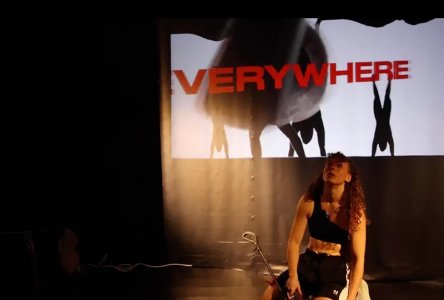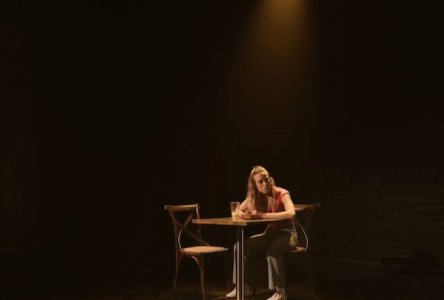
THE GLASS MENAGERIE
THE GLASS MENAGERIE, Ensemble Theatre 26 March-26 April 2025. Photography by Prudence Upton: above - Blazey Best, Bridie McKim, Danny Ball; below - Tom Rodgers, McKim; below again - McKim and Best
A production on opening night is a strange beast, most often charged with the overly enthusiastic energy of an audience of friends and family, plus those whose donations or otherwise elevated status give leave to be excitable. The second night is often relatively more realistic. The opening thrill is a weary memory and the real task of maintaining magic stretches ahead, for weeks.
So it seemed on The Glass Menagerie’s second performance when a typically well-fed Ensemble audience stolidly observed four actors giving their all in the cause of the play that made Tennessee Williams’s name and career. The 2.5-hour drama is Williams’ poetic dissection of his own sexual ambivalence, his love/hate mommy issues, and his enduring affection for a younger (schizophrenic and lobotomised) sister.
In director Liesel Badorrek’s reading, Tom/Tennessee (Danny Ball) is an amalgam of the character and the playwright’s writing about the play as a narrator. (In a 1940s script Williams’ stage directions cover more than a page before a word of dialogue is uttered.) There’s a voice-over, then Tom himself, setting the scene which “is dimly lighted, it is sentimental, it is not realistic.” It’s dream and memory, taking place in an apartment building which Williams’s notes call “warty growths in over-crowded urban centers of lower middle-class population”.

The Wingfield apartment is described in the Ensemble blurb as “living in squalor”, but Grace Deacon’s set is more genteel furnishings and Southern flora run amok. The wallpaper picturesquely melts across the floor of the living-dining room (the sultry summer, perhaps?) A cast iron fire escape, stage right, gives an unusual vertical dimension and where Tom decamps, to smoke and avoid his mother Amanda. Adding an anachronistic touch is a trumpet-topped phonograph – a quaint throwback to the 1920s when a portable record player would surely be the pride and joy.
Thing is, however, Amanda (Blazey Best) was, and in her mind still is, a Southern belle. Her memories of “gentlemen callers” and many servants may be a dream, but she is determined to make it a reality for her daughter Laura (Bridie McKim) at least. Yet Laura is a world removed from Amanda’s overblown fantasies and overbearing demeanour. Laura’s awareness of her difference – she is lame – is in contrast to her unacknowledged ethereal beauty. The disability has affected her from schoolyard to the present. She shuns society and lives through her beloved collection of small glass animals – the menagerie. All have names and stories, they are where she is somewhere approaching happy.
Her brother is not happy. High on the wall and emerging or retreating in prominence through Verity Hampson’s clever lighting, is a laddish photo portrait of the Wingfield patriarch. “The last we heard of him,” says Tom, “was a picture postcard from the Pacific coast of Mexico, containing a message of two words – ‘hello’ and ‘goodbye’ – and no address.” Tom is a warehouseman and yearns for adventure. He’s bought his merchant seaman’s union card, but the obligation to care for Laura and his mother drags at him.

Amanda goes on relentlessly about gentleman callers and Laura’s future until Tom brings home a work friend. Tom Rodgers’ Jim O’Connor is a handsome and sweet-natured fellow. He persists in trying to winkle Laura out of her shell and eventually persuades her to waltz – music drifting from the dance hall across the street. The second half is lifted and made memorable by the scene between them and its consequences. Rodgers is a generous foil, but Bridie McKim is a breathtaking stage presence: intuitive, present, intelligently economical, and riveting to watch. (The last Laura to be as effective was Eloise Oxer in 1997 when she stole the show from Robyn Nevin.)
In this production, which is judiciously paced and performed, the differences between mother and daughter are stark but largely because the mostly splendid Blazey Best is not. She gallops all over the Deep South with her accent at full screech, when not chewing the scenery and smoothing her bosom and buttocks. Whether this is to remind Amanda or everyone else that she is still gorgeous is a puzzle. Meanwhile, the men hold up their ends with style and understanding and the inevitable end grabs at one’s heart and breaks it.
Comments
Leave a Comment
Enter your username and password to comment. Don't have a username? Register now.




Be the first to leave a comment below